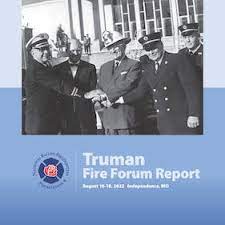Jan. 11, 2023 In 1947, President Harry Truman said: “It is the responsibility of every state and local official, and every citizen, to aggressively support this national war against the growing menace of fire.”
By Susan Nicol Source firehouse.com News
“It is the responsibility of every state and local official, and every citizen, to aggressively support this national war against the growing menace of fire.”
That’s what President Harry Truman said of the nation’s fire problem in 1947.
Rather than sit idly by and simply discuss how fires were killing Americans, Truman called officials to formulate a plan to address the issue.
While there have been strides, the country is a long way to calling the issue under control. Last year, 2,276 people died in home fires, according to the U.S. Fire Administration.
During the USFA Fire Prevention and Control Summit last year, U.S. Fire Administrator Lori Moore-Merrell pointed out that Jan. 8 was a historic day as there were no home fire fatalities reported.
In August, fire service officials from around the country met in Independence, MO, marking the 75th anniversary of President Harry S. Truman’s National Conference, and completed work initiated at three previous sessions.
The Truman Fire Forum Report, released Tuesday by the National Fallen Firefighters Foundation which hosted the conference, provides recommendations on actions that can be taken today, as well as strategies that will need the whole of the fire service to work toward decreasing the number of lives impacted by preventable fires.
Among the themes that emerged from the groups included:
1. Fire service members need to participate greater in community risk reduction.
2. The fire service should take a leadership role in working toward equity in housing to ensure citizens have both affordable and fire-safe housing.
3. All levels of government must increase enforcement and inspection of existing codes and standards for new construction, occupied structures, and vacant structures.
4. Coordinated collaboration from fire departments, governmental agencies, non-government organizations, and private enterprises is needed to address the challenges and solutions to the fire problem in America.
5. The goal of community risk reduction efforts must be long-term behavioral modification through data collection and analysis, storytelling, consistent messaging, and individual accountability.
6. The National Congress of American Indians and the Native American Fire Chiefs’ Association needs to be engaged in all efforts to make tribal communities fire safe.
Report authors made recommendations for specific organizations but stressed throughout the document at preventing fires is everyone’s responsibility.
They noted:
1. Improve academy instructions and emphasis for CRR and fire prevention. (It isn’t just about teaching stop-drop-and roll and smoke alarms.)
2. Rebrand CRR so that failure is considered with each fire.
3. Encourage and establish interaction with Fire Marshal’s Office and operations.
4. Make changes to AFG and SAFER grant programs to promote the use of grants for CRR, risk reduction training, and risk reduction staffing.
5. Utilize fire investigation findings to identify fire prevention needs.
6. Add fire prevention to Firefighter I and II training programs
